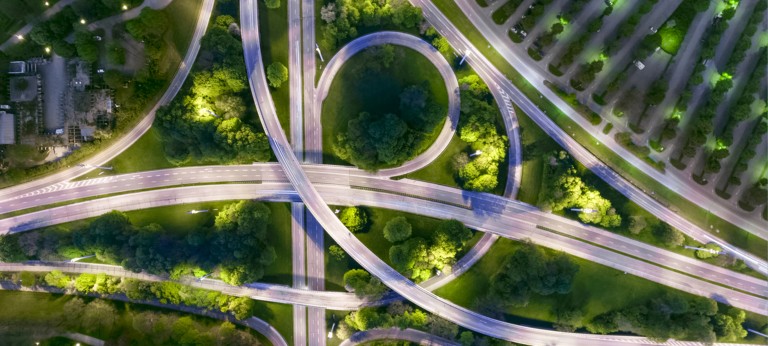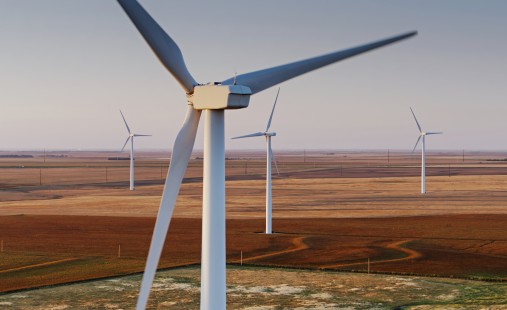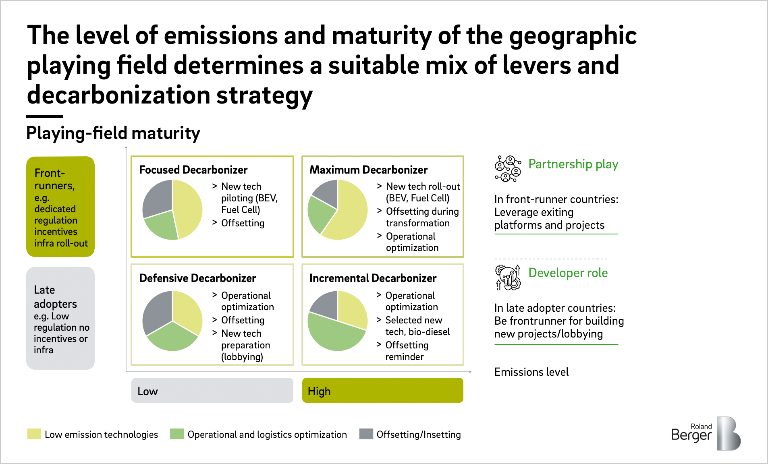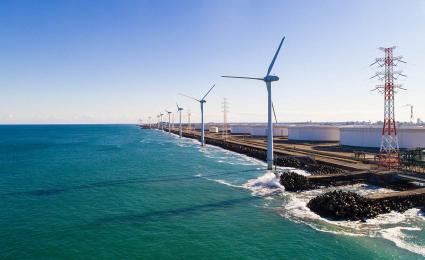Roland Berger is a thought leader in environmental issues and the response demanded from organizations. Our publications cover all relevant areas.


Decarbonizing transportation
By David Frans and Yvonne Ruf
Emission reduction pathways for your transportation and logistics operations
Pressure to decarbonize is rising
Road freight, and in particular heavy-duty trucks, are a major source of greenhouse gases (GHG), responsible for around five percent of global CO2 emissions and over a quarter of the EU CO2 emissions. The transportation and logistics sector is hence facing increased pressure to reduce its greenhouse gas emissions. Not just regulators, but even investors and consumers, are calling on the industry to develop climate-friendly operations , and reduce GHG emissions resulting from the use of fossil fuels.
Transportation and logistics – including road, rail, sea and air – represent a vital pillar of the European economy. This is reflected in the scale of the industry. For example, the road transportation sector has around 6.6 million medium and heavy-duty trucks on the road and around 300,000 new heavy-duty trucks are added to that number each year.
Too good an opportunity to miss
The good news is that companies that work on reducing their carbon footprint can now reap significant benefits. Understanding the options that are available helps businesses optimize their operating efficiency and their investments, both current and future. Many governments are offering incentives for decarbonization that operators of alternative transportation technologies can leverage. In Germany, for instance, companies can reduce the total cost of ownership of a battery-electric vehicle to roughly that of a diesel vehicle by taking advantage of the incentives offered by the government. While similar schemes for reducing GHG emissions exist in many countries, companies have not yet been able to exploit these effectively.
Reducing CO2 emissions and environmental impact in this carbon-intensive industry is not just important in order to comply with regulatory targets and achieve global climate goals. Climate Action is a clear opportunity. Potential wins include:
- Creating transparency about coming trends fueled by climate change , and their impact on your operations. This also helps investors assess your business better
- Optimizing investments in alternative technologies and assets with long lifetimes and investment cycles. This can secure you a sustainable competitive advantage for tomorrow
- Benefiting from the current policy momentum
- Creating a favorable brand perception by positioning your company as a frontrunner in reducing CO2 emissions
- Meeting customer demand for low-carbon, eco-friendly products and services
As pressure on the sector to decarbonize grows and opportunities arise, companies are faced with a new challenge: How can they determine the best decarbonization solution for their specific transportation profile, balancing emission reductions and competitiveness?
The Roland Berger Transportation Decarbonizer
Roland Berger offers comprehensive consulting services for the transportation and logistics industry. We apply our "Transportation Decarbonizer" to develop a tailored and actionable pathway for reducing the emissions generated by your operations. The Transportation Decarbonizer consists of five steps:
- Establish a baseline: First, we examine your transportation profile and use cases to establish a carbon emissions baseline for your business
- Analyze the playing field: Next, we carry out a detailed investigation of the market specifics including current regulatory situation, available incentives, infrastructure, geography as well as OEM strategies and vehicles available
- Match levers: Using the results of the first two steps, we match your operational transport profile with the optimal technological and operational levers for reducing your carbon footprint. We look at the full range of possible benefits and risks to your business
- Define pathways: The fourth step is to analyze the different decarbonization pathways available for your company. This includes looking at timelines, cost implications and potential transportation-related CO2 savings on an annual basis
- Implement: Finally, we draw up a Transportation Climate Action Plan and Roadmap specifically tailored to your transport and logistics routes which answers key operational questions around fuel supply, fleet transition and procurement. The roadmap also sets out clear points of action along each step of your decarbonization pathway
The optimum transportation pathway for your business depends on many factors including the technology in use, the nature of your business, market conditions, customer demand, regulatory pressure, carbon prices, geography and – equally importantly on – your own level of ambition. Will you be a Focused Decarbonizer, a Maximum Decarbonizer, a Defensive Decarbonizer or an Incremental Decarbonizer? Which technologies are appropriate for which route? Does it make sense to enter into partnerships? Using the Roland Berger Transportation Decarbonizer, we go through the possibilities with you, determine which approaches to decarbonization will work in your specific situation and develop a decarbonization pathway for you to implement.
Stay current with our latest insights on sustainability and climate action topics. We will email you when new articles and studies are published.
Our large team of climate experts works with multiple clients across different industries and geographies, helping organizations develop decarbonization actions and sustainability strategies. The Roland Berger Climate Action team is looking forward to hearing from you to find out which strategy is right for you!









